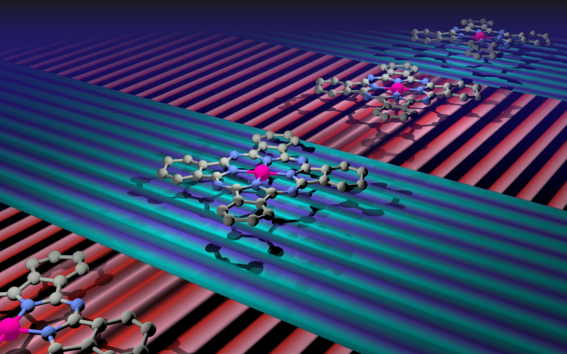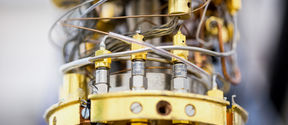InstituteQ - The Finnish Quantum Institute (external link)
InstituteQ coordinates quantum research, education, and business in Finland

Controlling the internal states of quantum systems is one of the biggest challenges in quantum materials. At the deepest level, single molecules can display different quantum states, even while possessing the same number of electrons. These states are associated with different electron configurations, which can lead to dramatically different properties.
The capability of controlling the electronic configuration of single molecules could lead to major developments in both fundamental science and technology. On the one hand, controlling the internal states of molecules may allow for the development of new artificial materials with exotic properties. On the other hand, it might also make possible the ultimate miniaturization of classical computer memories, with the two configurations could make it possible to encode a 0 and a 1 in a classical memory unit at the molecular level. However, controlling the internal states of molecules still remains a challenge, and realistic, scalable strategies for overcoming it have not been proposed.
In a recent experimental breakthrough researchers from Aalto University and the University of Jyväskylä demonstrated the ability to control the quantum states of individual molecules with an electrically controllable substrate. Their experiment showed how a specific two-dimensional material, known as SnTe, provides the instrumental strategy needed to control molecular states.
The mechanism demonstrated by the researchers is based on the ability of a substrate to tune the internal state of molecules due to internal electric fields. This mechanism, known as ferroelectric molecular switching, enables researchers to control individual molecules merely by applying a voltage to the substrate. The strategy relies on the strong tunability of SnTe by external voltages, which stems from a unique quantum property known as ferroelectricity.
The research team involved the groups of Professors Peter Liljeroth, Adam Foster, and Jose Lado from Aalto University, and the team was led by Professor Shawulienu Kezilebieke from the University of Jyväskylä.
'Our results demonstrate how we can control individual molecules using electrically-tunable two-dimensional materials. From a practical point of view, two-dimensional ferroelectrics have been instrumental, as its ultraclean interface allows realizing this strategy of quantum control. These experiments put forward a strategy to engineer quantum states at the molecular level, opening exciting possibilities in artificial materials and single-molecule electronics,' Kezilebieke says.
'In our experiments, we demonstrated how two-dimensional ferroelectrics allow us to realize electrically switchable quantum states. Controlling quantum states electrically is a major milestone in quantum materials, and here we demonstrated one strategy for doing it at the deepest level of individual molecules,' says PhD researcher Mohammad Amini, the first author of the study.
The quantum control of molecules via substrate effects opens up new possibilities in quantum matter, including engineering artificial molecular materials with switchable states. The research was recently published in Advanced Materials.


InstituteQ coordinates quantum research, education, and business in Finland

OtaNano is Finland's national research infrastructure for micro-, nano-, and quantum technologies


